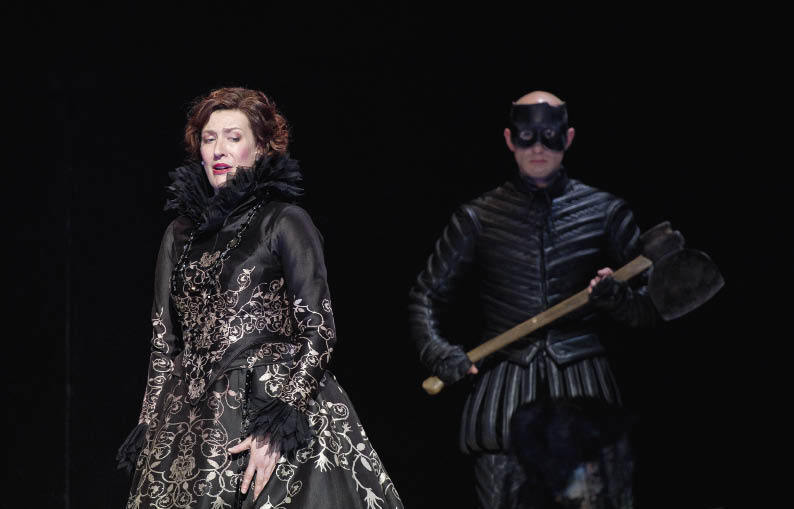Maria Stuarda; Rusalka
Opera North, in Leeds and on tour until July
Carmen
Royal Opera House, until 26 June
Donizetti’s Maria Stuarda is most celebrated for the apocryphal meeting of Mary Queen of Scots and Elizabeth, in which Mary descends to some coarse insults, backed up, in Antony McDonald’s new production for Opera North, by the use of a riding whip — Elizabeth has one, too, and the two queens do get quite physical. The drama here is stronger than the music, though, which is as perfunctory as most of the score, and only rises to an impressive level for the long monologues for the central characters, and especially the final scene — a very slow walk to the scaffold, inevitably.
Stars are needed, and in Sarah Connolly Opera North has one, though on the opening night it was announced before the second half that she had a throat infection, which you’d never have guessed. Connolly is a specialist in wronged queens, an expert in every shade of regret, recrimination, frustration, resignation and acceptance, using her voice like a great string player uses his bow. What, to me, she completely lacks is an aura of erotic appeal, so one is unconvinced that this Mary is the survivor of a spectacular career of liaisons. Her antagonist, taken by Antonia Cifrone, is more convincing as the Virgin Queen, at least in appearance, but despite having been a pupil of Tebaldi’s she commands no beautiful tone. The hapless Leicester is Bülent Bezdüz, slight of voice and figure, but a winning presence.
They all have uphill work with a production which clothes the queens in Elizabethan dress, the courtiers in mid-Victorian costumes, and the crowd in contemporary office-wear. Yet another directorial idea that someone should have congratulated him on, but then immediately have added that it was perhaps better to leave it for the present. Maria Stuarda does manage to get off the ground for the last half-hour, as Donizetti was adept at doing, but one does suffer getting there.
The next evening in Leeds was the first revival of the 2003 production of Dvorak’s Rusalka. The worryingly small audience was richly rewarded. Dvorak had little theatrical sense, for all that he regarded opera as central to his artistic endeavours. Yet the appeal of this myth, one which has so haunted composers, of a being from another, watery world (surely Mélisande is a near-member of the class?) who desperately needs to make contact with a human lover, but wreaks disaster when she does, was sufficiently powerful to elicit from Dvorak not only the unforgettable ‘Song to the Moon’, but also a lengthy score, much of which sounds very much like that song, while cunningly avoiding ever returning to it: so the listener, like me, who longs for that melody’s reprise is very much in the position of the Prince, endlessly appealed to by Rusalka, always frustrated by her inability to break through from gesture to speech.
Opera North’s production is of iceboxes, and almost all of it is black and white, waiting to be invaded by colour/feeling. But the most colourful presence is that of the Foreign Princess, the villainess, though one can hardly help sympathising with the Prince for wanting a consort with at least a bit of conversation. Richard Berkeley-Steele’s voice has survived his Wagnerian forays well, and though he wasn’t as moving as the Prince can be, he provided fervent support for Giselle Allen’s quite wonderful Rusalka. I had thought that last year’s Glyndebourne production had spoiled me for any other, but Allen, with Oliver von Dohnanyi’s intense and sympathetic conducting, persuaded me otherwise. A most worthwhile evening.
So, against the odds, was the Royal Opera’s latest revival of Francesca Zambello’s brain-dead production of Carmen. Actually, the revival director, Duncan Macfarland, has injected some local animation into it, all that anyone could do. The great thrill is Christine Rice’s Carmen, by far the most exciting I have ever seen or can imagine seeing. She sings with luscious abandon, but is surprisingly intimate, laughs convincingly, and — rarest gift of a performer of this role — manages to give the impression that she is a plaything of something beyond her control. All told, sensational.
This is a truly international affair. The conductor, Constantinos Carydis, is Greek: he brings fresh insights to almost every page of the score. Don José is the American Bryan Hymel, and though he lacks charisma, which helps in this impossible role, he sings with passion and acts decently. The Greek Aris Argiris is no more powerful an Escamillo than his predecessors have been, but he is sexy. The Latvian Maija Kovalevska is a glorious Micaëla, an ideal foil for Rice’s Carmen. There is one native French speaker in the cast, Nicolas Courjal as Zuniga. There is also a South African, an Irish woman and an Australian/Greek. The Royal Opera announces excitedly that the production will be filmed, ‘offering a stunningly realistic entertainment experience using next-generation digital 3D technology’, as in Avatar. Who complained that opera is élitist?






Comments